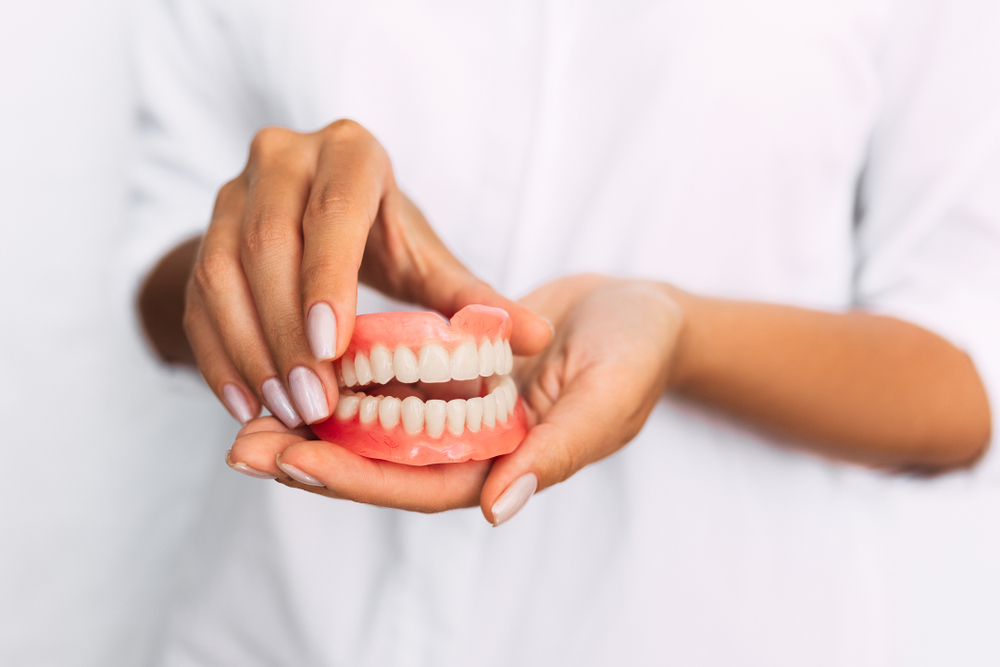
Removable dentures are prosthetic applications preferred in cases where there is a significant number of missing teeth that would hinder the healthy application of fixed prosthetics. Full dentures, also known as palate teeth prostheses for patients who have lost all their teeth, are applied as clasp-supported (hooked) or precision attachment (snap-on) partial dentures in cases where one or more teeth are present.
The selection of teeth for use in removable dentures plays an important role in the natural appearance and comfort of use of the prosthesis. When selecting teeth, the color, shape, size, and structure of the teeth are chosen to match the existing teeth in patients with teeth or, in the case of edentulous patients, to match the patient’s facial profile and expectations.
Can Removable Dentures Be Comfortably Used?
Removable dentures may cause discomfort in the mouth during the initial period of use. However, the areas causing this discomfort are adjusted during the control sessions, and the problem is quickly resolved. The soft tissues in the mouth adapt to empty spaces; therefore, some time is required for the tongue, lip, and cheek muscles to get used to the prosthesis. After these tissues re-adapt to their required positions, the patient can comfortably use the prosthesis.
Partial dentures maintain their stability to a large extent and do not cause discomfort if the dental supports are balanced. Removable prostheses can be easily used in a stable manner if there is sufficient bone tissue for support in patients who have lost all their teeth. However, if the bone support is insufficient, implant placement may be considered to enhance support.
What Are the Types of Removable Dentures?
Removable denture types are varieties that can be easily inserted and removed by the patient and vary depending on the number and location of missing teeth. These prostheses are generally found in the following five types:
- Total Dentures: Typically used in adults, total dentures are preferred when there are no teeth remaining in the mouth. These dentures, which are supported by the upper and lower bone tissue, are known as removable dentures and provide comfort to the user as they can be easily inserted and removed. Over time, they may undergo color changes as they are made of plastic.
- Partial Dentures: Used in mouths where some natural teeth remain, these prostheses can be made of acrylic or cast metal. Partial dentures, which attach to the main teeth, may sometimes have an undesired wire appearance from an aesthetic standpoint.
- Precision Attachment Dentures: Used in cases of multiple missing teeth, these dentures obtain their retention from the remaining natural teeth in the mouth. They are removable dentures without clasps, and the retentive appliances are hidden inside porcelain crowns.
- Immediate Dentures: Used in situations where all main teeth need to be extracted, these dentures prevent the patient from being toothless. They are temporary healing dentures placed immediately after the natural teeth are extracted, and permanent dentures are made once healing is complete.
- Overdentures: These are prostheses created by providing support on existing natural teeth or roots. They provide comfort to the user by obtaining support from natural teeth.
Each type of prosthesis is chosen according to the individual’s needs and oral structure and should be applied by a professional dentist.
What Is the Lifespan of Removable Dentures?
The application lifespan of removable dentures generally ranges from 5 to 7 years on average. Prosthetic teeth are specially made based on the anatomy of the mouth. However, they are affected by changes that occur in the mouth over time, leading to a decrease in retention.
The materials used in making dentures are affected by the temperature of the food and drinks consumed over time, which can compromise the hygiene of the denture and lead to bacterial growth.
Removable dentures are placed on the ridge covered with gum tissue where the extracted teeth remained. If a person gains or loses weight, the fit of the dentures can be affected. In such cases, the use of dentures can be uncomfortable for the individual and may cause oral and dental health problems.
Therefore, regular check-ups and necessary adjustments should be made during the long-term use of removable dentures. Additionally, attention should be paid to the hygiene of the dentures throughout their lifespan and the recommended care instructions provided by the dentist should be followed.
How Should Dental Cleaning Be Done for Removable Dentures?
Cleaning is extremely important in the application of removable dentures. The cleaning routine for those using removable dentures should include the following steps:
- After meals, removable dentures should be removed, and the remaining natural teeth in the mouth should be brushed and cleaned.
- Removable dentures should be carefully cleaned using a soft toothbrush, not with toothpaste. This prevents damage to the denture and ensures hygiene.
- When removed, dentures should be placed in a container with cold drinking water. However, no substance or cleaner should be added to the water.
- At least once a week, dentures should be thoroughly cleaned using denture cleaning tablets available in pharmacies. These tablets clean the plaque and bacteria accumulated on the inner and outer surfaces of the denture, ensuring its hygiene.
When these cleaning steps are regularly followed, removable dentures can be used in a healthy and hygienic manner.
Free Consult
Fill out the form, one of our officials will call you as soon as possible and let’s start planning your treatment by answering all your questions.
Or Call Us +90 537 957 20 37

